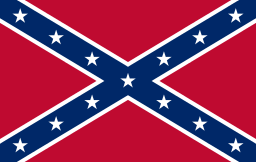Trauma
The Confederate Flag: Heritage or Hate?
Confederate symbols contribute to America's racial trauma.
Posted July 6, 2015
Key points
- When I moved to the South, I was puzzled to encounter streets, parks, and monuments named after Confederate figures.
- Symbols like the Confederate flag are actually covert forms of racism called microaggressions.
- People who willingly fought for the right to own slaves are not heroes.

My passage into the South began with a move from my homeland in California to the center of Virginia to pursue graduate studies over fifteen years ago. My move raised many an eyebrow among my West Coast comrades, who warned me that I would be living amongst cows and chickens. This did not turn out to be true, as I discovered that Charlottesville, Virginia was a quaint and progressive college town. What did surprise me were pervasive symbols of the Confederacy embedded into the fabric of daily life.
I was puzzled and frightened to encounter streets, parks, and monuments named after Southern Civil War figures. I had moved Virginia on the heels of the last statewide celebration of Lee-Jackson-King Day. For those of you who have never heard of the holiday (I hadn’t), it was enacted in 1983 as an effort to jointly celebrate Confederate Generals Thomas J. "Stonewall" Jackson and Robert E. Lee, bizarrely, on the same day as Civil Right’s Activist Martin Luther King, Jr.
In 2000, Virginia Governor Gilmore proposed splitting Lee-Jackson-King Day into two separate holidays after debate arose over whether a holiday which simultaneously celebrated Confederate generals and a civil rights icon was, well, incongruous. Thus, the two holidays are now celebrated separately as Lee-Jackson Day and Martin Luther King, Jr. Day. Interestingly, Lee-Jackson Day is now observed on the Friday right before Martin Luther King, Jr. Day.
I soon learned how cherished the memory of the Confederacy is to many Southerners. Nonetheless, as an African American, who did not grow up around these symbols, they still jar me to the core when I am confronted with them. I now live in Kentucky and each day during my trek from the parking lot to my office at the University of Louisville I am visually assaulted by a 70-foot-tall obelisk in the center of a busy intersection. It is the largest Civil War monument in the state, made of granite with German-designed Confederate soldiers made of bronze. The soldiers are an artillerist, a cavalryman, and an infantryman, all dressed in war gear. Owned by the city of Louisville, the monument commemorates the “sacrifice” of Confederate veterans. Although some community activists have called for the monument’s removal, both the city and university opposed such proposals.

What message might the presence of this monument communicate to African Americans like me? The monument was erected to celebrate people who were willing to die for the right to keep a whole race of people permanently enslaved. Such symbols serve as environmental microaggressions, subtle forms of racism, that contribute to the ongoing distress and traumatization of African Americans. African Americans may endure microaggressions in many forms over the course of a day or a lifetime, and the cumulative toll contributes to stress and unwellness, that can increase susceptibility to more serious conditions, including posttraumatic stress disorder.
The Confederate Battle Flag is itself a microaggression. Supporters use the flag to celebrate the courage and valor of their Confederate ancestors, however it also serves as a painful reminder to those of us with a cultural memory of the horrors of slavery. Keep in mind that the leader of the Confederacy, Jefferson Davis, had this to say about my people: “African slavery, as it exists in the United States, is a moral, a social, and a political blessing,” and “You cannot transform the negro into anything one-tenth as useful or as good as what slavery enables them to be.” Despite the fact that the Civil War ended 150 years ago, African Americans as a group continue to suffer due to our stigmatized minority status. My mother tells me stories of her experiences in the segregated South and as a Civil Rights activist in college, and although many things have improved since then, it strikes me that Jim Crow was really not that long ago.
Meanwhile, as Black America struggles for true equality, the Confederate flag is embraced by White supremacists. A photo of shooter Dylann Roof waving the Confederate flag before he murdered 9 Black people in a church nicely illustrates the point.
I was curious as to what possible rationale people known as “Flaggers” could advance for the ongoing support of those who came down on the wrong side of history. I visited a few Flagger websites, and was stricken to discover that a ceremonial hoisting of the flag occurred just a week ago in Virginia. The dedication read as follows: “The Battle Flag will fly as a living breathing memorial to those men, and all of our Confederate soldiers and Veterans. . . To the glory of God and in memory and honor of our Confederate heroes. 1861-1865.” I could only stare in disbelief as I examined the photo of a White man dressed in a Confederate uniform, smiling in front of a flag raised by a busy highway.
So let's clarify a few things here. First of all, people who willingly fought for the right to own slaves are not heroes. They were criminals and deserve all the shame and dishonor that we can heap upon them for their actions. Had these people won the war, I and my whole family would be slaves, to be bought, sold, beaten, or raped at the whim of the master. That is not a cause anyone should fight for. People whose ancestors fought for the Confederacy should not be happily hoisting battle flags. They should be pensively reflecting on the horrors of a war that was fought to maintain a Southern economy driven on the backs of human chattel.
In Germany, there are many people whose ancestors were members of the Nazi Party, who even fought for Hitler and gassed Jews. Their descendants are not proud of what they did, rather they are ashamed of it. They certainly don't parade around with Nazi flags or sport little swastika bumper stickers that shout “heritage not hate.” Instead they make their high school students visit concentration camps so the next generation can learn how to prevent this sort of tragedy in the future. We can take a lesson from the Germans. Most of them know that putting a whole race of people in concentration camps was wrong. Likewise, enslaving a whole race of people is wrong too. We shouldn't celebrate the honor of those who fought for the right to own slaves because there is no honor in it. Confederate soldiers deserve no monuments, no flags, no glory, and no honor. 750,000 people were killed in the Civil War, a failed armed rebellion against our nation. It’s time to dismantle those monuments and remove the Confederate flag from public property.
Is there a place for the Confederate Battle Flag? Yes, in museums as a symbol of pain, tears, death, regret, failure, and loss. America is still working to repair the damage caused by enslaving and subjugating a whole race of human beings. Although the Civil War is over, our country still bleeds.
Real American Hero Bree Newsome takes down the Confederate Battle Flag at the South Carolina State Capitol.
References
Williams, M. T. & Kanter, J. W. (2019). Promoting diversity and inclusion on college campuses. In M.T. Williams, D. C. Rosen, & J. W. Kanter (Eds.), Eliminating Race-Based Mental Health Disparities: Promoting Equity and Culturally Responsive Care Across Settings (pp. 243-276). Oakland, CA: New Harbinger Books.




